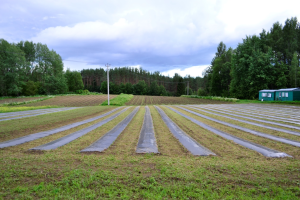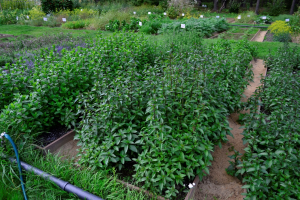New medicinal products of plant origin – Prospective ways of cooperation and SPCPA opportunities

In 2019 the St. Petersburg State Chemical-Pharmaceutical Academy of Russian Ministry of Health (SPCPA) celebrates its 100th anniversary. Started in the beginning of 20th century, research of medicinal plants still remains one of the leading scientific directions of the Academy.
SPCPA is interested to find industrial partners among companies and organizations in Baltic Sea Region to implement joint projects in the field of herbal products development including partnership in Interreg BSR projects.
Joint Interreg BSR projects activities could include: preparative extraction and purification of natural compounds; confirmation of the structure of individual substances by spectral analysis; analysis of the biological activity using in vitro methods; development of equipment for the primary processing and drying of plant raw materials.
Partnership with BSR companies will allow SPCPA to realize its ambition concerning development of new natural drugs for treatment and prevention of socially significant diseases (disorders of fat and carbohydrate metabolism, metabolic syndrome and liver diseases).
About
The development of knowledge-based, innovative and investment attractive pharmaceutical industry is a strategic direction of the Russian economy and health care.
The richest natural resources (over 10,000 wild-growing and several hundred cultivated species) make Russia a promising supplier of plant raw materials for the needs of world pharmaceutical science and practice, and an attractive partner for joint international research in this field. Russian traditional medicine presents to researchers a huge potential for finding new plant objects.
The availability and renewability of natural resources allow considering plants as sources of safe and active molecules for the pharmaceutical industry. Plants possess high diversity of chemical composition, but only a small part of their pharmacological potential is used by modern medicine.
SPCPA Phytopharmaceutical platform
Phytopharmaceutical platform created on the basis of the St. Petersburg State Chemical-Pharmaceutical Academy of Russian Ministry of Health (SPCPA) is regarded as the intellectual, scientific, and industrial platform for research and development of active pharmaceutical and food substances of plant origin. We use knowledge on the chemical composition of medicinal plants and biological activity of natural compounds accumulated since the times of the Soviet Union.
The platform consists of 9 structural divisions of the SPCPA:
- Department of Pharmacognosy has all the resources for the storage, quality control and phytochemical analysis of plants and raw plant materials. Staff of the Department has a long-term experience in investigation of medicinal plants, including more than 200 plant objects.
- The nursery of medicinal plants (at the present time more than 200 species of herbaceous plants, trees and shrubs, most of which are used in scientific and folk medicine are cultivated here. The nursery is a unique ecological and scientific object of Eastern Europe, where the technology of scaled cultivation and harvesting of medicinal plants are developed). Much attention is paid to the problems of vegetative propagation of aromatic plant species with unique chemotypes).
- The Department of Organic Chemistry (carries out an organic synthesis of pharmaceutical substances with anti-microbial, antifungal, anti-ischemic, anti-arrhythmic, anti-inflammatory activity etc.)
- Centre for Quality Control of drugs performs the following work:
– Development of analytical methods to verify the authenticity, purity of drugs
– Validation of the developed techniques
– Selection of methods for the analysis of the dosage forms and substances
– Analysis of the dosage forms and substances, including high performance liquid chromatography, gas chromatography, IR, UV spectroscopy, capillary electrophoresis
- Centre of Experimental Pharmacology conducts research in the following areas:
- Screening studies of pharmacological activity of biologically active substances of synthetic, plant and microbial origin
- Study of specific activity and safety of potential drugs
- Study of the effectiveness and safety of new formulations
- Development of new models of pathological conditions, modification of known models and their testing
- Development of preclinical testing algorithms for drugs of different pharmacological groups and creation of guidelines
- Centre of Pharmaceutical Technology designs innovative drugs forms (forms with a continuous, delayed and modified release (tablets, coated tablets, matrix, multilayer tablets, hard gelatin capsules, pellets); multicomponent forms containing several active substances; microencapsulated drugs (microcapsules, retard tablets and Rapid retard, etc.); ophthalmic forms (eye drops, ophthalmic films); soft medicinal forms (ointments, gels, suppositories); dosage forms for children (granules, syrups, suspensions for the reception inside)
- Dosage forms technology department
- Department of industrial technology of drugs
- Department of pharmacology and clinical pharmacology.
SPCPA capabilities
The scientific background, instrumental base and human resources make it possible to address the following methodological, technical and technological objectives and offer SPCPA services in the following areas:
- Having a long-term experience in cultivating, harvesting and studying of medicinal plants we suggest developing information and analytical electronic database of medicinal plants of Baltic Region. It will contain information on chemical composition (including chemical formulas), medicinal use (the data of traditional and scientific medicine), and images of medicinal plants. The database will be compiled on the basis of up-to-date scientific literature, textbooks and encyclopedias (including books and CD issued by Saint-Petersburg State Chemical Pharmaceutical Academy). The database will be a website with the ability of searching for information by different criteria (the name of the species, genus and family in English, Russian and Latin, the name of the chemical compound, biological activity of total extracts and molecules, including those predicted by specially designed computer program, etc.). Such structured information will be convenient for students studying medicinal plants as well as for all the users looking for proven scientific information. We suppose educational and scientific organizations, farms and pharmaceutical companies to be users of this database. The database will allow choosing plant objects promising for further scientific research and creation of phytodrugs.
- Harvesting of wild or cultivated plant raw material. Development of technologies of cultivation and drying plants with certain chemotype parameters and in accordance with the requirements of the GACP;
- The study of the chemical composition (phytochemical screening) of medicinal plants to select the main group of biologically active substances for the further obtaining of medicinal substances and dosage forms;
- Standardization of plant raw materials and the development of regulatory documents (Projects of monographs for Russian and European Pharmacopoeias);
- Development of technologies for the production of total and purified extracts from medicinal plants; justified choice of the composition, rational formulation and technology of drugs based on natural products;
- Evaluation of the pharmacological activity of the total extract and individual agents in experimental in vivo models of pathological conditions, as well as the study of their general and specific toxicity, allergenicity and teratogenicity;
- Evaluation of the possibility of chemical modification and synthesis of active molecules on the basis of pharmacological studies and computer predictions; implementation of chemical modification and synthesis.
Partnership Objectives
Cooperation with colleagues from the Baltic region would be important for the implementation of the project because of their experience in some areas of scientific and practical activities:
- Instrumental base for preparative extraction and purification of natural compounds (Preparative HPLC and GLPC).
- Confirmation of the structure of individual substances by spectral analysis (in particular by means of NMR-spectroscopy).
- Analysis of the biological activity using in vitro
- The development of equipment for the primary processing and drying of plant raw materials.
Partnership with countries of Baltic region will allow SPCPA to realize its ambition concerning development of new natural drugs for treatment and prevention of socially significant diseases.
Socially significant diseases
In the framework of phytopharmaceutical platform, we draw attention to natural drugs for the prevention and treatment of a number of so called socially significant diseases, such as disorders of fat and carbohydrate metabolism, metabolic syndrome and liver diseases.
The listed conditions are widespread both in Russia and in Europe. Most often these diseases are chronic and require long-term drug therapy. Synthetic drugs using for the long time have a number of undesirable side effects, so in such cases it is preferable to use drugs of natural origin.
The objective of the project is obtaining new promising natural compounds and development of active pharmaceutical substances of plant origin for the treatment and prevention of socially significant diseases in partnership between St. Petersburg State Chemical-Pharmaceutical Academy and scientific and educational organizations of Baltic Sea Region.
A list of promising medicinal plants was compiled. It includes about 20 plant objects growing on the territory of Russia, having sufficient resources or cultivated in SPCPA. Using a computer prediction of biological activity individual compounds with hypoglycemic, antidiabetic and hepatoprotective activities were planned for isolation for each plant object.
The expected results
- Developed technologies of cultivation and drying of medicinal plants can be used by farmers engaged in the cultivation and harvesting of medicinal plants for the medical industry.
- Projects of monographs for Russian and European Pharmacopoeias will be used to standardize and introduce new herbal medicinal raw materials into medical practice.
- Individual substances of plant origin with a confirmed molecular structure and pharmacological activity will be used to create new effective and safe drugs.
- Protocols preclinical research will form the basis of patents for new medicinal substances. The results of the project will be published in the form of scientific articles in international journals.
- Attracted young specialists will use the results of the project in educational activities in the educational institutions of Russia and foreign countries.
- Based on the results of the project, educational programs will be created for students and graduate students in the courses of botany, pharmacognosy, phytochemistry and technology of medicines.
The availability of natural resources of Russia allow considering plants as rich sources of active molecules for the pharmaceutical industry. The proposed project will make possible the cooperation of Russia and countries of Baltic region in the field of new safe and efficient drugs development on the base of obtained natural substances.
SPCPA of the Russian Ministry of Health is interested in partnership with educational and research institutions for joint solutions in the field of herbal products development and active involvement in the activities of the phytopharmaceutical platform.
For further reading: Download the presentation New herbal products for the treatment and prevention of socially significant diseases
Contacts:
Dr.Grigory Rozhkov, International projects coordinator, SPCPA,
Dr.Maria Povydysh, associate-professor, Head of R&D, SPCPA, e-mail:


ScanBalt News
17 March 2025
LifeScience4EU Conference 2025 | 15-16 May | Krakow











